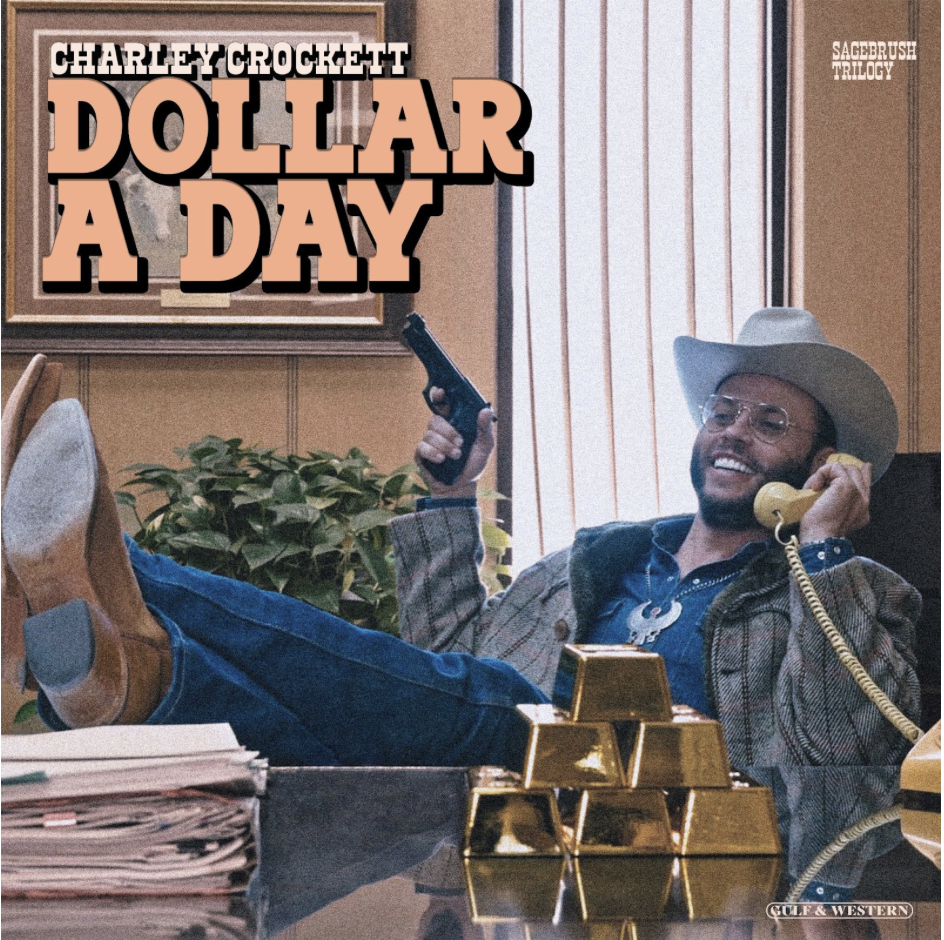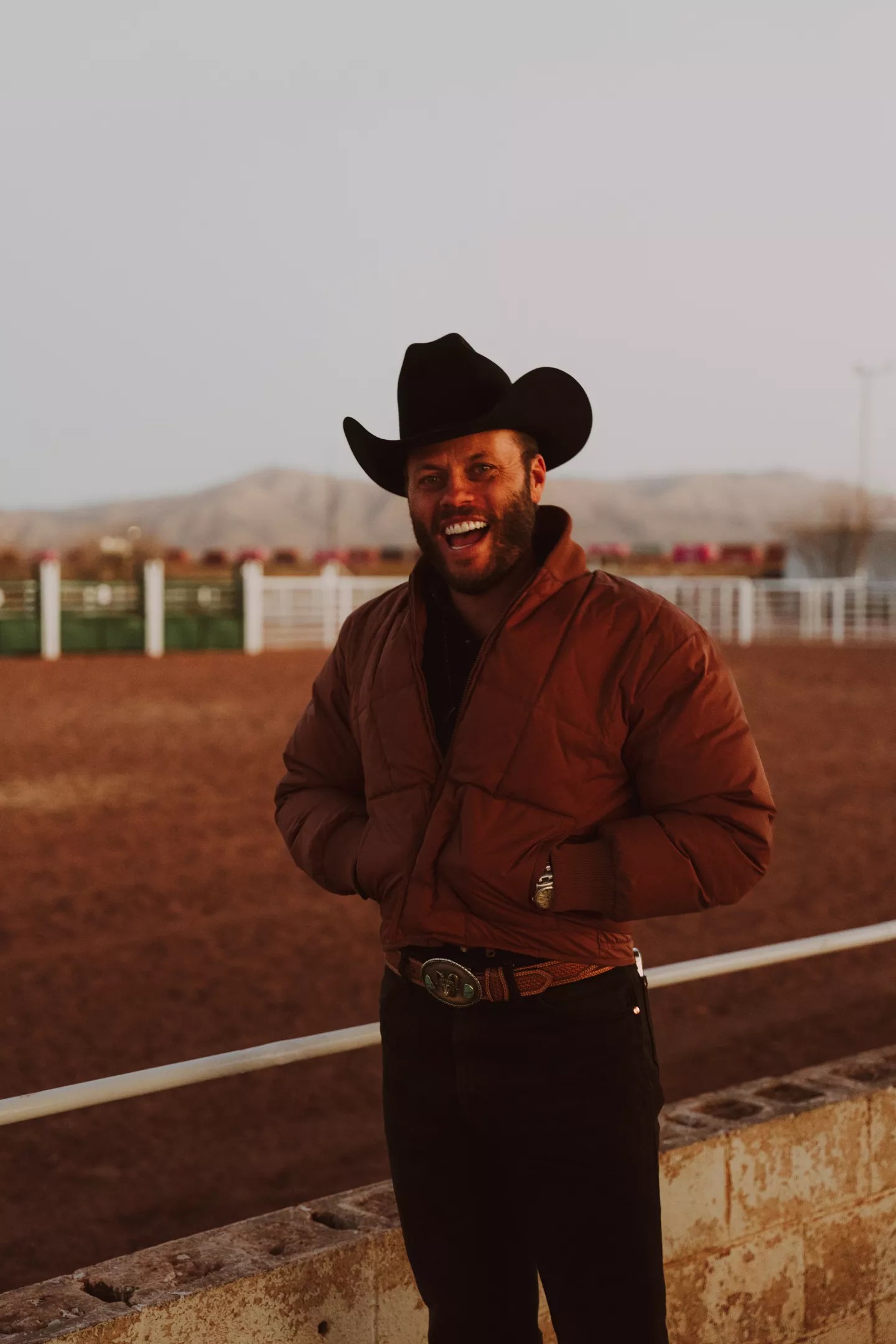
Rachel Parker

Audio By Carbonatix
Charley Crockett’s Dollar A Day marks the return of modern country’s most prolific artist. This is the second installment of Crockett’s Sagebrush Trilogy, three albums produced in collaboration with Shooter Jennings. The first album in the trilogy, Lonesome Drifter, was released by Island Records in March 2025, marking Crockett’s major label debut.

Courtesy of Island Records
Over the past decade, Crockett’s profile has steadily grown, his fan base swelling. His music is a study in contrast, managing to sound classically country while experimenting, incorporating elements of the blues, jazz and soul music to give songs their own unique flavor. Crockett’s secret weapon is his distinctive voice, which is warm, casual and unexpectedly emotional. He spins tales of down-on-their-luck Westerners of now and yesteryear with humor and compassion and without judgment.
Lonesome Drifter was a mixed bag in relation to Crockett’s other recent output. It had its high points (“The Death of Bill Bailey”) but portions felt overproduced, particularly Crockett’s covers of “Jamestown Ferry” (which he covered on a previous album to more success) and “Amarillo By Morning.” Crockett has been effusive about his partnership with Shooter Jennings on the Sagebrush Trilogy, but after Lonesome Drifter, it seemed possible this new era may be one marked by a less authentic sound.
All that said, Dollar A Day brings Crockett back to his roots, doubling down on what he does best from beginning to end as he tells his Western tales.
At 15 tracks, this is an expansive and varied LP. It may not be quite as progressive as some of Crockett’s previous albums (2022’s The Man From Waco, in particular), but it still manages to incorporate his varied influences to enrich its sonic palette.
Songs build on one another and almost carry forward the stories of common protagonists. The album’s title track kicks things off, telling the story of a cowboy reflecting on his profession and the difficulties of making a living from it. It is a gentle, melancholic opener and pairs well with the album’s third song, “Woman in a Bar.” The latter is a piano-forward piece about a man smitten with – you guessed it – a woman in a bar.
Similarly, “Crucified Son,” the album’s high-energy second track (and the first released) pairs well with its fourth, “Ain’t That Right.” “Crucified Son” stands in contrast to “Dollar A Day,” telling the story of a man who has had success, been to the mountaintop and found that it just makes him an easier target for the masses. “I walk out the door / they call me friend / and drive nails into my name,” sings Crockett. “Ain’t That Right” presents a similar character talking about what a “dangerous game / where people get abused” show business is.
“Santa Fe Ring,” “Age of the Ram (Theme),” and “I Stay Ready” later form their own cinematic triptych. In “Santa Fe Ring,” the narrator is hunted by the titular Ring. “Age of the Ram (Theme)” follows on its heels, an instrumental that marks the album’s halfway point. It plays like a melody that would accompany a montage of the protagonist wandering, on the run. “I Stay Ready” seems to catch up to the same character some time later, considering his life on the run. “I see a vision, all cloaked in red / Those who laid a price upon my head,” sings Crockett. “There’s no promise what tomorrow brings / So I stay ready for anything.”

At 15 tracks, this is an expansive and varied LP. It may not be quite as progressive as some of Crockett’s previous albums (2022’s The Man From Waco, in particular), but it still manages to incorporate his varied influences to enrich its sonic palette.
Courtesy of Island Records
“All Around Cowboy,” Crockett’s story of a man who traded success for good times, seduced by “the whiskey and the women,” is a later standout. It has the feel of a classic country song, no bells or whistles, just Crockett soulfully singing, “Maybe tomorrow things will get better. / If the devil lets loose of his soul / he’ll be an all around cowboy again.” A simple song, and one that highlights Crockett’s strengths as a storyteller, taking time to describe the character rolling a smoke, wiping whiskey from his whiskers, and smiling, thinking about his glory days.
That storytelling streak is strong throughout the album. In “Santa Fe Ring” the character calls out the caliche coating his pursuer’s jackets “for they had journeyed long;” in “Ballad of a Lonesome Drifter,” the story of a self-proclaimed Texican, Crockett describes the character’s Mexican boots, his Stetson hat, the way his gun hangs low, “trigger tied back.” These small character moments and their specificity make Crockett’s songs feel real and compelling, the characters tangible.
It should be noted that all is not doom and gloom in Crockett’s stories, either. “Tennessee Quick Cash” features a classic Crockett lead, a musician who cannot catch a break, approached by a woman who recommends he get a loan from a local business, the Tennessee Quick Cash, if he is hard up for money. “Now I know what you’re ’bout to say / About their predatory ways / But, brother, least they let you know it right up front,” croons Crockett on the album’s most straightforwardly entertaining song.
Crockett’s experimental side shows on “Lone Star,” a jazzy track that feels like the theme song for an old Western flick, and on “I’m Gonna Die With My Dreams On.” The latter song features Crockett calling his own shot, saying he will go out “singing some old-fashioned love song / to a girl [he] ain’t known long.” It would be at home alongside slower country anthems of the ’80s and ’90s, and it stands out musically thanks to its Tejano influence, a trumpet carrying the bridge.
By the time Dollar A Day reaches its epic conclusion in “Alamosa,” which lyrically refers back to the “Age of the Ram,” Crockett has flexed his storytelling chops, his ability to interweave his musical influences with the classic country his music is in the tradition of and made a compelling case for himself as an artist who can go bigger while staying true to his roots. It caps off an album that, like Crockett as an artist, is unafraid to circle back to earlier songs and sounds, building and expanding upon them, moving the musician’s work into exciting new areas.